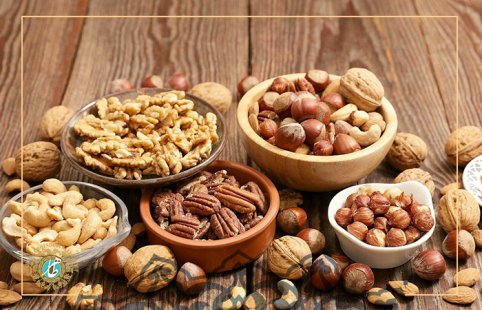
It is one of the most important and stable members of Iranian nuts, whose potassium content is equal to that of orange with this small body, and it is very important due to its nutrients.
All the tips about the types of nuts
Pistachio
It is one of the most important and stable members of Iranian nuts, whose potassium content is equal to that of orange with this small body, and it is very important due to its nutrients.
which Pistachios can be eaten raw or dried. Research shows that pistachios are one of the most nutritious oil seeds, rich in minerals and vitamins, which are useful for fighting anemia, lowering bad blood cholesterol, regulating body pH and as a great snack to reduce appetite and lose weight.loosing
-
different types of berry
Dried berries have dense nutrients. It tastes sour or sweet and is used in jams, desserts or alone. Dried berries are rich in vitamin C, fiber and antioxidants. Berries also improve heart health by lowering LDL cholesterol and reducing the risk of heart attacks.
-
Dried apricots
Apricot leaf is one of the most popular dried fruits that also has many properties. It is rich in potassium; Potassium prevents an excessive increase in sodium in the blood, so it can be used to prevent high blood pressure. The risk of a sudden rise in blood pressure, cholesterol and even blood sugar is also greatly reduced.
-
Seed
The protein-rich and high-fat seeds of some plants, which are eaten both roasted and raw, are called seeds.
There are different types of seeds such as:
Sunflower seeds: These seeds can be considered a rich source of B vitamins, especially B5, which are rich in zinc, phosphorus, potassium, manganese, iron, folate and magnesium.
Watermelon Seed: One of the prominent characteristics of this seed is the presence of abundant niacin in it, which eliminates wrinkles, prevents yellowing of the skin, tightens the skin and eliminates itchy skin. Of course, in addition to these benefits, watermelon seeds can also be used to regulate blood pressure, eliminate pimples, keep skin healthy and compensate for iron deficiency.
Pumpkin seeds: Among the benefits of pumpkin seeds, we can mention the presence of vitamin E, strengthening intelligence and memory, deworming the body, the presence of phytosterols and linoleic.
Melon seeds: Blood formation is a prominent feature of melon seeds. In addition to this property, melon seeds have iron, vitamin E, fiber, fat, protein and also antioxidant properties.
Japanese seed (nut seed): This seed is a product of one of the villages of Damavand city called "Jaban or Jaboon" which in ancient times its seed was known as Japanese seed and due to its frequent use and passage of time and due to this word similarity to Japanese Has been renamed to Japanese seed.
-
Almond
Sweet almonds contain 40 to 50% oil. Almonds also contain 25% of the white matter and diastase called emulsin and also contain sugar, gum, mucilage and minerals. The amazing effect of almonds on lowering bad cholesterol and preventing clogged arteries is a fact that has been proven in medical science.
6 . Raisin
Raisins are dried grapes. This nut is a rich source of iron, which is useful for people suffering from anemia. Give your children raisins daily to help to improve digestive problems. Also help with weight gain and a home remedy for constipation is needed.
Also helps with weight gain and it's a home remedy for constipation.
-
peanut
Peanut is a fruit plant that is native to Brazil. To cultivate this nut, a warm climate is needed to give the plant a height of 30 to 50 cm. The important thing about peanuts is that they may traditionally be considered nuts and dried fruits, but they actually belong to the legume family. Peanuts dilate blood vessels and facilitate blood flow, preventing blood clots and stroke.
8.Indian Almond
To the fruit of an evergreen tree grown in the tropics, ???
Indian Almond (cashews) said. The production of this evergreen tree is a small seed that is hot and dry in nature and must be native to Brazil. This nut is rich in copper and is needed to produce more energy and astonishing flexibility of blood vessels and needs. Indian Almond spoil quickly at room temperature and lose their properties and should be stored in the refrigerator.
-
Hazelnut
Hazelnut has many nutritional properties and values, so it prevents many diseases. For every 30 grams of hazelnuts, which equates to an average of 23 nuts, there are 183 calories. This amount of hazelnuts has 18.5 grams of fat, 8.5 grams of carbohydrates, 3.4 grams of protein and about 2 grams of water.
Hazelnuts with a special oil (oleic acid), protein, carbohydrates, beta-sitosterol, vitamins and essential minerals have a special place among other nuts.
Therefore, consuming 25 to 30 grams of hazelnuts per day protects the body against both heart disease and cancer.
-
Soy
Daily consumption of soy in the amount of 2 to 3 units of food per day can help reduce the symptoms and complications of menopause, and of course, it often delays menopause.
One module of soy is equivalent to three and a half tablespoons of soy beans
-
Dried figs
Figs belong to the berry family. It is soft and juicy and has crispy grains. It is usually grown in Asian and Middle Eastern countries. It usually grows in rocky, dry and wild areas. Dried figs have more nutrients than fresh figs.
-
Dried peaches
Peaches are rich in protein, fat, cholesterol, sodium, carbohydrates, sugar, fiber, calcium, iron, phosphorus, potassium and magnesium. Peach fruits taste good when dried. in a dried type
-
Prunes
Plums are rich in nutrients such as 31% water, 64% carbohydrates, B vitamins and minerals. When the fruit matures, it has a dark purple color. Soaked prunes help digest food.
-
BlackBerry
Dried blackberries are rich in vitamins, antioxidants and fiber. This is a delicious and chewy snack rich in vitamins A, C, E and K, calcium, magnesium, sodium and zinc. Mexico is the world's largest producer of blackberries.
-
Arica nuts
Areca Nut is the fruit of the Erica palm. This plant grows in the tropics, the Pacific, Asia and the southeast. Arica nuts affect all parts of the human body including the heart, lungs, brain, reproductive organs, digestive system and immune system.






User comments